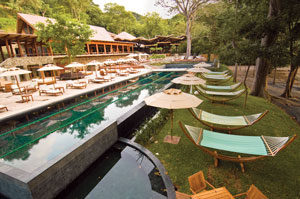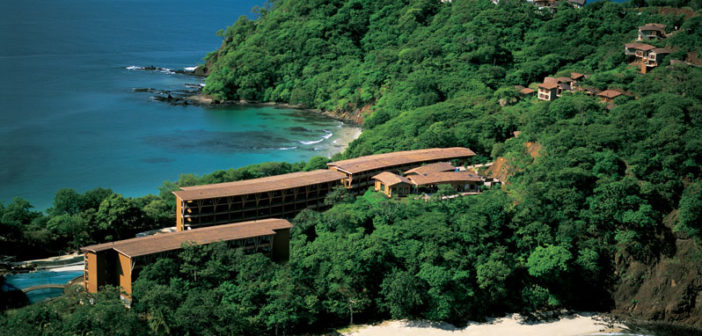MIAMI—Seeing an opportunity to develop several new hotels—in addition to creating a relationship with Four Seasons Hotels and Resorts—a Gencom affiliate’s acquisition of Costa Rica’s Peninsula Papagayo will bring major changes to the area.
As one of the largest owners of Ritz-Carlton properties—in addition to several other luxury hotels and being a stakeholder in the newly formed company created by the merger of Benchmark Resorts & Hotels and Gemstone Hotels & Resorts—Gencom has a lot of experience with luxury hotels, but this acquisition includes its first Four Seasons property. Karim Alibhai, principal of Gencom, said, “We’re looking to expand that relationship quite significantly.”
In addition to the 182-key Four Seasons Papagayo, the acquisition of the 1,400-acre luxury master development in Costa Rica’s Guanacaste province includes an 18-hole Arnold Palmer-designed golf course and clubhouse, the 180-slip Marina Papagayo and the 38,000-sq.-ft. Prieta Beach Club.
Speaking to the acquisition’s fit in the current portfolio, Alibhai said, “Our portfolio consists of a number of luxury resorts, mixed-use with homes and villas, condominiums. From a viewpoint of being synergistic with our portfolio, it’s very much there. We’re very excited.
“The Peninsula Papagayo was developed almost 12 to 13 years ago, and has become one of the preeminent destinations in Central and Latin America. It was anchored by the Four Seasons, which is ranked as the only five-star Forbes Travel Guide resort in Central and South America,” continued Alibhai, referencing all of the luxury amenities that make the piece of land appealing to both guests and ownership.
But what was just as important was what wasn’t there. “Essentially, the infrastructure that was originally put in place for the peninsula was to have multiple hotels and resorts,” said Alibhai, noting that in addition to the Four Seasons, there is also an Andaz resort nearby, but not much else in the way of hotel properties. “This acquisition is very well-positioned for us to take it to another level,” he said.
The initial capitalization was some $250 million, but the company plans to spend more than $500 million in the coming years. This includes spending roughly $20 million on improvements to the Four Seasons and another $30 million on the existing infrastructure, including the marina, golf club and beach club. “The Four Seasons will be a complete rooms makeover, including adding more plunge pools in rooms and suites. The current mix is rooms and villas, so it would be bringing in what the modern luxury traveler expects—everything from technology upgrades to floors to bathrooms, etc.,” said Alibhai. “And in the commercial area, the whole sense of arrival will be reworked, including the lobby, the restaurants and the spa. That’s the main scope on the hotel side.”
Alibhai noted that when it comes to the additional infrastructure—such as the beach club— the bones are extremely good. The work there will include “adding more restaurants, everything from an upscale sports bar and restaurant to other themes, so people coming to the peninsula would have the ability to, whether they want to go formal or casual, go to a place and hang out, to give it a casual elegance across the board.”
The company plans to roll out and complete this phase over the next 15 months. Ownership is partnering with Costa Rican developer Sinergo Development Group to carry out the renovation of existing assets and to assist in the development of future phases. Other members of the design team include local architecture firm Zurcher Arquitectos and New York-based design firm Meyer Davis.
And, of course, the company will also look to add more luxury residential properties and hotels to the peninsula over the next five to seven years. “We’ll look to develop additional luxury resorts, including maybe a wellness type of brand to bring out there because Costa Rica caters on the ecotourism side,” said Alibhai.
Referencing Mexico’s Punta Mita and Mayakoba, Alibhai noted the peninsula will be similar to those areas. “In the case of Punta Mita, they have a golf course, a Four Seasons, a St. Regis and a Rosewood. In Mayakoba, they have a Fairmont, a Rosewood, a Banyan Tree and an Andaz being built,” he said. “Quite similarly, the idea is to have tiered product that caters to different levels of customer bases… The other brands we’re bringing in would look to complement the mix similar to those other developments.”
The peninsula currently has more than 750 employees and Alibhai noted the acquisition would result in more job creation. The group also plans to invest more in the local community and continue the work of Creciendo Juntos (which translates to Growing Together), a local nonprofit organization that supports elementary and high schools with educational programs and preventative healthcare.
“Part and parcel of what we try to do is expand some of the social causes and invest in the local community and the people,” said Alibhai. Gencom’s Donald McGregor, added, “Given the level of service we’ve experienced here in the more than year-and-a-half we’ve been working there, we think there’s more work to be done. It’s part of our business plan to make an effort to ramp that up.”

Amenities such as Prieta Beach Club will also undergo renovations to give guests more enhanced and diversified options.
Gencom is particularly keen on Costa Rica. “We’re very bullish. The government has done a great job of continuing to promote tourism and safety in the country,” said Alibhai. “The service and the people are amazing. It’s a combination of being a beautiful country, but more importantly, the beautiful people coupled with a proactive solid government, that really makes this one of the premium places for us to be investing in in that part of the world.”
It also represents an opportunity to take a deeper dive into experiental travel. McGregor said that Papagayo is also a complete 180 from what the company sees in the Caribbean, where Gencom has properties, including Marriott Grand Cayman Resort and Molasses Reef, Ritz-Carlton Reserve in West Caicos in Turks and Caicos. “Costa Rica is more adventure driven—you walk out of your room and get woken up by monkeys,” he said, comparing the topography to that of Hawaii (where Gencom also has holdings). “But it’s way more accessible to the east and southern coasts of the United States and Canada than taking the long haul.”
McGregor added that the reviews and feedback from guests say it’s a totally different experience. “You have resorts in the Caribbean where the hotel is above 90% occupancy and the pool is beyond crowded. People go to the pool, the beach, etc.,” he explained. “You go to this hotel and it’s at peak occupancy, and it doesn’t feel as busy, and it’s just because everyone is either ziplining, on ATVs, horseback riding, hiking, trekking, river rafting, adventure tours, surfing… There are a lot of activities that also allow us to extend the length of stay. It seems that’s where the trend is going.”
Proximity is another huge bonus. “It’s a two-hour flight from Miami, three and a half hours from Atlanta. So, it’s very close, and you can see that when 92-93% of customers are coming from the U.S., with a high concentration from the East Coast,” McGregor said.
Alibhai also added, “Since 2009, the airlift has almost tripled coming into Liberia [the capital and largest city in the Guanacaste province], which is the main feeder airport coming into the peninsula. There’s a lot more direct access from major markets in the U.S. and other places. We see that continuing to expand. The destination is very ready and primed to accept the new demand that will result from this airlift.”
“In terms of the investment on the property, it’s a development that has incredible bones and infrastructure to service five times more of its vertical product. The infrastructure is there, the amenities are there and now it’s a matter of having more product to offer, targeting somewhat different demographics and then achieving that critical mass. Now we just have to go to Papagayo 2.0,” concluded McGregor. HB


